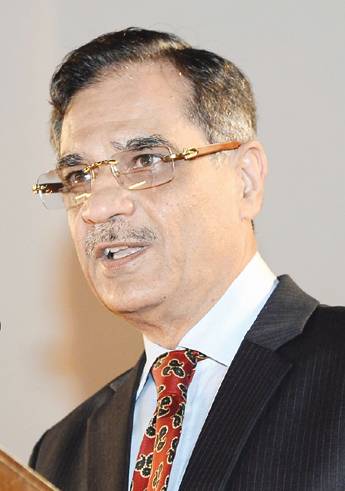ISLAMABAD - Chief Justice of Pakistan Mian Saqib Nisar on Wednesday took a suo motu notice of the killing of people belonging to the Hazara community in Quetta.
Taking cognizance, the chief justice directed the chief secretary, home secretary, Inspector General of Police (IGP) Balochistan, Frontier Constabulary through secretary interior and secretary defence to submit a report within 10 days.
The departments and other LEAs are asked to submit before the top court as to what measures taken under their charge to ensure security of the Hazara community. They are further directed to also report the causes for their failure to safeguard the lives of the members of the Hazara community.
The notice was taken during the course of hearing of a case regarding 20 bullet-riddled dead bodies found in the area of Tehsil Turbat and Buleda of District Kech Balochistan.
Heading a three-judge bench, Justice Saqib Nisar observed that it has been pointed out by the members of the Bar and it has widely been published in the news media that during the last several years, the Hazara community living in Quetta has been a target of repeated terrorist attacks driven by ethnic and sectarian hatred.
According to a report by the National Commission for the Human Rights released in March this year, the Hazara community has suffered 509 killings in Quetta city during the last five years from January 2012 to December 2017.
“During the month of April 2018 alone, there have been four separate terrorist attacks on Hazara men resulting in the death of six persons,” the press statement stated issued later after the hearing.
Chief justice further observed that the right to life is the most sacred human right guaranteed by Article 9 of the Constitution adding that this right has been violated with impunity by miscreants against the small and dwindling community which is otherwise peaceful and law abiding.
“There has been a failure of the law enforcement agencies to protect the fundamental rights of this community. Such a state of affairs affects the fear and indemnity of Shia community in Pakistan and represents a matter of great public importance,” press statement quoted chief justice as saying.
Meanwhile, another three-judge bench headed by Justice Ijaz Afzal Khan was informed that 1,330 people have been detained in different internment centres.
Additional Attorney General (AAG) Sajid Ilyas Bhatti submitted an interim report during the hearing of missing persons’ case.
The bench was further informed that 253 internees have also been released.
However, AAG Bhatti requested the bench to grant two weeks time for submitting complete details when he was confronted with the court’s query as to whether the proceedings have been initiated against the centre.
During the hearing, Justice Khan observed that heirs of missing persons are helpless and they approach the courts and the commission for help.
According to Advocate Inamur Rahim, counsel for some of the missing persons, they are not asking for release but they only wanted to know in which offence the persons are being interned.
He informed the bench that the top court in 2014 had ordered for placement of Tasif Ali’s detention order adding that since then the court’s order has not been complied.
The counsel expressed his concerns that if the situation persists in the same manner, then people would approach to Manzoor Pashteen after retirement of Justice Khan for release of their loved ones.
However, Justice Khan responded that even after his retirement the top court would function as Justice Maqbool Baqir and Faisal Arab would be available.
Counsel Rahim also submitted the case of Arshed Bilal who was awarded death penalty by a military court but has been missing since 2011 when he was a juvenile.
The court directed Rahim to approach the Lahore High Court for Arshed Bilal. Amna Masood Janjua informed the bench that no progress has been made since 2016 on the applications of three missing persons including Hanif, Usama and Qasim.
The case has been adjourned for 15 days.
Shafqat Ali adds: Pakistan People’s Party leader Farhatullah Babar yesterday warned that stifling the voice of Hazaras Tahaffuz movement can transform into Shia Tahaffuz movement.
Addressing a gathering of journalists at the National Press Club to commemorate the international day of freedom of the press, Babar said that suffocating Mehsud Tahhafuz movement had resulted in formation of Pushtun Tahhafuz movement.
“Suppressing freedom of expression can be far too dangerous than is realized. Until now freedom of expression was under threat from state and non-state actors but now it was under attack from invisible forces and called for immediate course correction before it was too late,” he said.
Babar said that Pakistan, according to the UN, was among the most dangerous countries for journalists. “Indeed, it is most dangerous not only for journalists but for anyone exercising constitutional right to freedom of expression and daring to present alternate narrative to that of the state,” he added.
Babar said he was deeply perturbed when activists of protesting Hazaras said that they will meet only the army chief because he alone could address their grievance and not with chief minister or the home minister.
“The underlying political narrative of this demand is most unsettling. It is not only a denunciation of the entire civilian law and order machinery but it also implies some disturbing assumptions,” he said.
Babar said that crimes against journalists were committed with impunity and except in two cases out more than hundred the perpetrators of crimes had not even been identified let alone prosecuted and punished. “This impunity of crimes must come to an end,” he said.
The PPP leader asked the political parties to include in their manifestos a chapter on protection and safety of journalists and to end impunity of crimes against them.
CJP takes suo motu notice of Hazaras’ killing
SYED SABEEHUL HUSSNAIN






